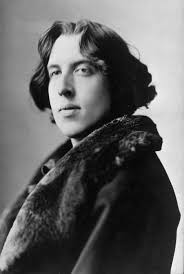The Picture of Dorian Gray Page #37
The Picture of Dorian Gray is a Gothic and philosophical novel by Oscar Wilde, first published complete in the July 1890 issue of Lippincott's Monthly Magazine. Fearing the story was indecent, prior to publication the magazine's editor deleted roughly five hundred words without Wilde's knowledge.
For, while he was but too ready to accept the position that was almost immediately offered to him on his coming of age, and found, indeed, a subtle pleasure in the thought that he might really become to the London of his own day what to imperial Neronian Rome the author of the Satyricon once had been, yet in his inmost heart he desired to be something more than a mere arbiter elegantiarum, to be consulted on the wearing of a jewel, or the knotting of a necktie, or the conduct of a cane. He sought to elaborate some new scheme of life that would have its reasoned philosophy and its ordered principles, and find in the spiritualizing of the senses its highest realization. The worship of the senses has often, and with much justice, been decried, men feeling a natural instinct of terror about passions and sensations that seem stronger than themselves, and that they are conscious of sharing with the less highly organized forms of existence. But it appeared to Dorian Gray that the true nature of the senses had never been understood, and that they had remained savage and animal merely because the world had sought to starve them into submission or to kill them by pain, instead of aiming at making them elements of a new spirituality, of which a fine instinct for beauty was to be the dominant characteristic. As he looked back upon man moving through history, he was haunted by a feeling of loss. So much had been surrendered! and to such little purpose! There had been mad wilful rejections, monstrous forms of self-torture and self-denial, whose origin was fear and whose result was a degradation infinitely more terrible than that fancied degradation from which, in their ignorance, they had sought to escape; Nature, in her wonderful irony, driving out the anchorite to feed with the wild animals of the desert and giving to the hermit the beasts of the field as his companions. Yes: there was to be, as Lord Henry had prophesied, a new Hedonism that was to recreate life and to save it from that harsh uncomely puritanism that is having, in our own day, its curious revival. It was to have its service of the intellect, certainly, yet it was never to accept any theory or system that would involve the sacrifice of any mode of passionate experience. Its aim, indeed, was to be experience itself, and not the fruits of experience, sweet or bitter as they might be. Of the asceticism that deadens the senses, as of the vulgar profligacy that dulls them, it was to know nothing. But it was to teach man to concentrate himself upon the moments of a life that is itself but a moment. There are few of us who have not sometimes wakened before dawn, either after one of those dreamless nights that make us almost enamoured of death, or one of those nights of horror and misshapen joy, when through the chambers of the brain sweep phantoms more terrible than reality itself, and instinct with that vivid life that lurks in all grotesques, and that lends to Gothic art its enduring vitality, this art being, one might fancy, especially the art of those whose minds have been troubled with the malady of reverie. Gradually white fingers creep through the curtains, and they appear to tremble. In black fantastic shapes, dumb shadows crawl into the corners of the room and crouch there. Outside, there is the stirring of birds among the leaves, or the sound of men going forth to their work, or the sigh and sob of the wind coming down from the hills and wandering round the silent house, as though it feared to wake the sleepers and yet must needs call forth sleep from her purple cave. Veil after veil of thin dusky gauze is lifted, and by degrees the forms and colours of things are restored to them, and we watch the dawn remaking the world in its antique pattern. The wan mirrors get back their mimic life. The flameless tapers stand where we had left them, and beside them lies the half-cut book that we had been studying, or the wired flower that we had worn at the ball, or the letter that we had been afraid to read, or that we had read too often. Nothing seems to us changed. Out of the unreal shadows of the night comes back the real life that we had known. We have to resume it where we had left off, and there steals over us a terrible sense of the necessity for the continuance of energy in the same wearisome round of stereotyped habits, or a wild longing, it may be, that our eyelids might open some morning upon a world that had been refashioned anew in the darkness for our pleasure, a world in which things would have fresh shapes and colours, and be changed, or have other secrets, a world in which the past would have little or no place, or survive, at any rate, in no conscious form of obligation or regret, the remembrance even of joy having its bitterness and the memories of pleasure their pain. It was the creation of such worlds as these that seemed to Dorian Gray to be the true object, or amongst the true objects, of life; and in his search for sensations that would be at once new and delightful, and possess that element of strangeness that is so essential to romance, he would often adopt certain modes of thought that he knew to be really alien to his nature, abandon himself to their subtle influences, and then, having, as it were, caught their colour and satisfied his intellectual curiosity, leave them with that curious indifference that is not incompatible with a real ardour of temperament, and that, indeed, according to certain modern psychologists, is often a condition of it. It was rumoured of him once that he was about to join the Roman Catholic communion, and certainly the Roman ritual had always a great attraction for him. The daily sacrifice, more awful really than all the sacrifices of the antique world, stirred him as much by its superb rejection of the evidence of the senses as by the primitive simplicity of its elements and the eternal pathos of the human tragedy that it sought to symbolize. He loved to kneel down on the cold marble pavement and watch the priest, in his stiff flowered dalmatic, slowly and with white hands moving aside the veil of the tabernacle, or raising aloft the jewelled, lantern-shaped monstrance with that pallid wafer that at times, one would fain think, is indeed the "panis caelestis," the bread of angels, or, robed in the garments of the Passion of Christ, breaking the Host into the chalice and smiting his breast for his sins. The fuming censers that the grave boys, in their lace and scarlet, tossed into the air like great gilt flowers had their subtle fascination for him. As he passed out, he used to look with wonder at the black confessionals and long to sit in the dim shadow of one of them and listen to men and women whispering through the worn grating the true story of their lives. But he never fell into the error of arresting his intellectual development by any formal acceptance of creed or system, or of mistaking, for a house in which to live, an inn that is but suitable for the sojourn of a night, or for a few hours of a night in which there are no stars and the moon is in travail. Mysticism, with its marvellous power of making common things strange to us, and the subtle antinomianism that always seems to accompany it, moved him for a season; and for a season he inclined to the materialistic doctrines of the Darwinismus movement in Germany, and found a curious pleasure in tracing the thoughts and passions of men to some pearly cell in the brain, or some white nerve in the body, delighting in the conception of the absolute dependence of the spirit on certain physical conditions, morbid or healthy, normal or diseased. Yet, as has been said of him before, no theory of life seemed to him to be of any importance compared with life itself. He felt keenly conscious of how barren all intellectual speculation is when separated from action and experiment. He knew that the senses, no less than the soul, have their spiritual mysteries to reveal.
Translation
Translate and read this book in other languages:
Select another language:
- - Select -
- 简体中文 (Chinese - Simplified)
- 繁體中文 (Chinese - Traditional)
- Español (Spanish)
- Esperanto (Esperanto)
- 日本語 (Japanese)
- Português (Portuguese)
- Deutsch (German)
- العربية (Arabic)
- Français (French)
- Русский (Russian)
- ಕನ್ನಡ (Kannada)
- 한국어 (Korean)
- עברית (Hebrew)
- Gaeilge (Irish)
- Українська (Ukrainian)
- اردو (Urdu)
- Magyar (Hungarian)
- मानक हिन्दी (Hindi)
- Indonesia (Indonesian)
- Italiano (Italian)
- தமிழ் (Tamil)
- Türkçe (Turkish)
- తెలుగు (Telugu)
- ภาษาไทย (Thai)
- Tiếng Việt (Vietnamese)
- Čeština (Czech)
- Polski (Polish)
- Bahasa Indonesia (Indonesian)
- Românește (Romanian)
- Nederlands (Dutch)
- Ελληνικά (Greek)
- Latinum (Latin)
- Svenska (Swedish)
- Dansk (Danish)
- Suomi (Finnish)
- فارسی (Persian)
- ייִדיש (Yiddish)
- հայերեն (Armenian)
- Norsk (Norwegian)
- English (English)
Citation
Use the citation below to add this book to your bibliography:
Style:MLAChicagoAPA
"The Picture of Dorian Gray Books." Literature.com. STANDS4 LLC, 2024. Web. 27 Nov. 2024. <https://www.literature.com/book/the_picture_of_dorian_gray_869>.




Discuss this The Picture of Dorian Gray book with the community:
Report Comment
We're doing our best to make sure our content is useful, accurate and safe.
If by any chance you spot an inappropriate comment while navigating through our website please use this form to let us know, and we'll take care of it shortly.
Attachment
You need to be logged in to favorite.
Log In